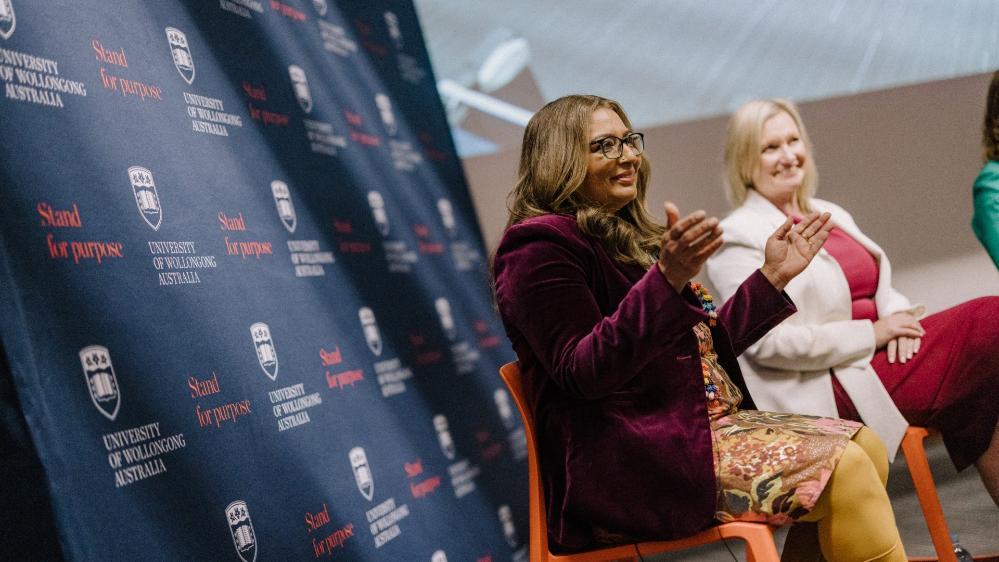July 4, 2023
International Women in Engineering Day celebrated at UOW
Senator Mehreen Faruqi encouraged future engineers to be bold and take risks
On Friday 23 June, the University of Wollongong (UOW) Faculty of Engineering and Information Sciences hosted a keynote address by Senator Mehreen Faruqi followed by a panel discussion with industry leaders to mark International Women in Engineering Day.
Engineers Australia has predicted that the country may face a shortage of up to 50,000 engineers by 2030, which is particularly problematic when engineers have the skills to tackle the specific challenges the world is currently grappling with.
Professor Madeleine du Toit, Associate Dean of the Faculty of Engineering and Information Sciences said, “Engineers are at the forefront of tackling the biggest challenges we face today. From decarbonisation to new fuels, structural and biomedical, there is so much breadth in the field of engineering.”
UOW Vice-Chancellor and President Professor Patricia M Davidson welcomed students, staff and the men who ‘get it’ to International Women in Engineering Day.
“Diversity is a fundamental pillar of progress and innovation in any profession, but it’s ground-breaking in the fields traditionally dominated by men. In engineering, a diverse workforce brings together a range of perspectives, experiences and talents, enabling smart and innovative solutions to complex problems.
“I invite current and future students to challenge the stereotype and once you reach the top, send a ladder down for more women to come up.”
Senator Mehreen Faruqi opened her address sharing that she enjoys being at a university because it feels like being among friends. With a career spanning academia, state and federal politics, she considers herself to be an engineer first and foremost.
Senator Faruqi credits being an engineer and being a woman with being able to handle the breadth of her role as a Senator for NSW covering the varied portfolios of education, anti-racism, animal welfare, international aid and global justice and the republic.
Growing up in Lahore, form an early age Faruqi was aware of inequality and discrimination. She learned early from her father that education is really the only way to break out of intergenerational poverty.
“I come from a family of engineering tragics,” Senator Faruqi said. “Every time I cross the Sydney Harbour Bridge I get goosebumps. It is a marvel of engineering and a reminder of the vision of engineers of the past. When the bridge was built it could fit all the cars in Sydney and today it is still fit for purpose.”
“Engineering skills such as problem solving apply to everything, to many varied problems. Engineers use an evidence-based approach, which sadly, I have seen pushed aside for political ideals.”
“Engineers should have a role in influencing politics, especially women, who are so deeply aware of structural disadvantage that is baked into the system.”
“Making change is not easy, but now is the time to take risks, to be bold and courageous. As engineers we need to take responsibility for the change we need. Let's get political and restructure power and privilege – let's influence, advocate and bring about change”
Senator Faruqi was the first Muslim woman in Australian parliament and only the 100th woman in the senate when she joined in 2018, decrying a stark difference between the diversity we see on Australian streets and who represents the people in government.
“Diversity brings about innovative decision making and that’s good for democracy. The World Economic Forum predicted that it will take 135 years to reach gender parity – that is completely unacceptable”
“I see politics as public service. It is an old-fashioned idea, but some ideas from the past are worth holding on to.”
The Senator was then joined by a panel of prominent women form the engineering industry - Dr Rochelle MacDonald, Executive General Manager of Squadron Energy; Siobhan O’Brien, UOW PhD Student; Michaela Brown, Senior Structural Engineer at ARUP and Lauren North, Principal Sustainability Partnerships at BHP.
The panel discussed the strengths women bring to engineering, including unique levels of organisation, strong skills in collaboration, emotional intelligence and an innate ability to overcome alpha male energy and help build a more collegial environment in work sites.
One of the biggest challenges the industry faces is how to attract and retain female engineers. The panel agreed that the best way to do this is to educate the world on what a career in engineering really is – it's a problem-solving endeavour which is a strong pull to many.
